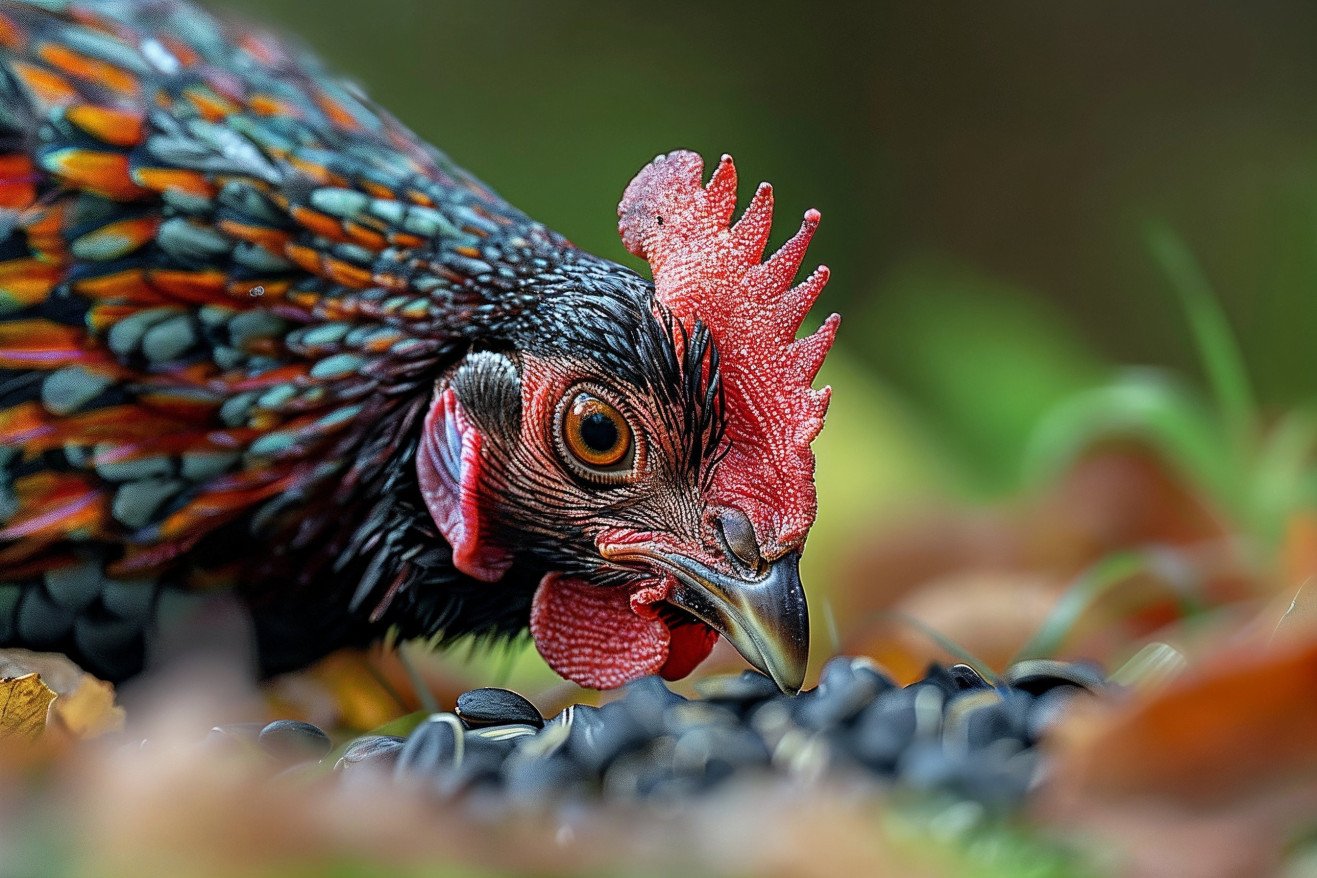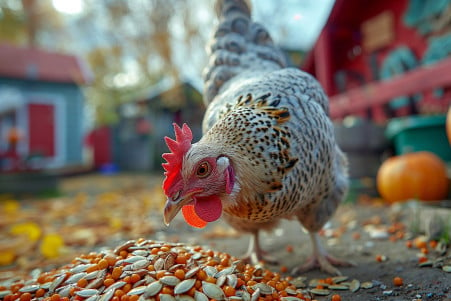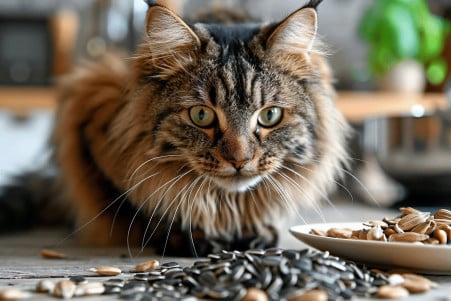Can You Give Chickens Sunflower Seeds? We Weigh the Pros and Cons
6 April 2024 • Updated 6 April 2024

Thinking about tossing some sunflower seeds to your chickens? Before you do, you may want to know more about the potential benefits and downsides of this crunchy snack. Although sunflower seeds can offer chickens some nutrients, such as vitamin E and selenium, they should be part of a well-rounded diet and fed in limited quantities. Overconsumption of sunflower seeds can lead to problems like obesity and other health concerns because they are high in fat and calories.
When it comes to feeding chickens, there are lots of different opinions based on a wide range of research in the areas of poultry nutrition and management. By looking at veterinary studies, agricultural recommendations, and personal experiences of chicken keepers, we can get a well-rounded view of how sunflower seeds fit into a chicken's diet. This article will give you the information you need to make the best choices for your chickens when it comes to feeding them sunflower seeds while keeping their health and happiness in mind.
Can chickens eat sunflower seeds?
What Nutrients Do Sunflower Seeds Offer Chickens?
Sunflower seeds are a great source of essential vitamins, minerals, and fats for chickens. In addition, the oil in sunflower seeds can help chickens maintain shiny, well-insulated feathers and stay warm in the winter, according to Beginning Farmers. They can also help improve egg production and quality in laying hens.
According to Hobby Farms, black oil sunflower seeds are made up of about 50% fat and 20% protein, which makes them a great source of energy for chickens. In addition, the seeds have a high oil content and thin shells, which makes them easy for chickens to eat. The fat in sunflower seeds is mostly monounsaturated fat, as explained in a PetHelpful article.
Sunflower seeds are also high in vitamin E, which is important for immune function and skin and feather health. They also contain calcium, which is important for strong eggshells, as well as zinc and selenium, which are important for reproductive health, and antioxidants. Black oil sunflower seeds are more nutritious than striped sunflower seeds, with an oil content of 40-50% compared to 25-30% for striped seeds, according to Raising Happy Chickens.
In addition, the extra protein that chickens get from sunflower seeds can be especially helpful during molting, when chickens need more nutrients. Sunflower seeds are a good source of a variety of nutrients, and when fed in moderation as part of a balanced diet, they can be a good dietary supplement. However, it's important to know how much to feed chickens to avoid overfeeding.
How to Feed Sunflower Seeds to Chickens
As mentioned by MyPetChicken, because sunflower seeds are high in fat and calories, they should be fed as a treat and not make up the bulk of a chicken's diet, so they should be fed in moderation. The Happy Chicken Coop suggests that a good rule of thumb is to feed a small handful of sunflower seeds every two to three days as a treat in addition to their regular feed.
The suggested serving sizes are about 1/4 cup per day for standard-sized chickens, 2 tablespoons for bantams, and 1 tablespoon or less for chicks under 12 weeks old, according to Chickens and You. Overfeeding sunflower seeds can lead to obesity, nutritional deficiencies, and digestive issues because of their high fat and calorie content.
To ensure that your chickens get exercise and forage for their food, you can sprinkle sunflower seeds around the chicken run or yard. However, to prevent overeating, it's best to feed them as a treat rather than leaving them out for chickens to eat whenever they want, as noted by The Happy Chicken Coop. Feeding sunflower seeds in moderation will help ensure that your chickens have a well-rounded diet and maintain their overall health.
Whole Sunflower Seeds vs. Sunflower Hearts
Chickens can eat both the sunflower heart and the shell. According to BackYard Chickens, feeding chickens whole sunflower seeds, including the shell, can have some nutritional advantages over feeding just the heart. The shell is high in fiber, which can help with a chicken's digestion. It also has trace amounts of minerals like calcium, magnesium, and phosphorus, which can help with bone strength and eggshell thickness.
Research has shown that chickens can digest and absorb the nutrients in the sunflower seed shell. Wild Mountain Homestead explains that feeding whole sunflower seeds can increase the overall protein, fat, and energy content of a chicken's diet compared to feeding just the heart. However, Hobby Farms explains that sunflower hearts (the heart without the shell) or shelled sunflower seeds are a cleaner and easier option, even if they are more expensive. You should never feed chickens processed sunflower seeds that are meant for human consumption, as they may contain unhealthy additives or spices.
How to Feed Sunflower Oil to Chickens
Sunflower oil can be fed to chickens in small amounts as part of their diet, according to a discussion on BackYard Chickens. A little sunflower oil added to moistened chicken feed can offer some of the same benefits of feeding black oil sunflower seeds (BOSS), including better feather quality and support during molting.
That said, sunflower oil should be used sparingly since too much can lead to weight gain and other health problems. As mentioned in the Wholly Holy Living article, BOSS is a better option than corn, offering more protein, fat, and fiber. Increasing the protein in the diet through BOSS can also help reduce the length of the molting period and maintain egg production.
Another option is to feed chickens sprouted sunflower seeds, which can offer many of the same nutritional benefits of BOSS without the fat. Sprouting sunflower seeds is an easy way to give chickens access to this superfood without the risk of overfeeding them oil.
How to Grow and Harvest Sunflower Seeds for Chickens
Sunflowers are easy to grow and can add a bright spot to your garden while providing a healthy treat for your chickens. As explained by Grit, larger sunflower varieties, such as Mammoth or Titan, will yield more and bigger seeds per head.
To harvest the seeds, Grit says to cover the heads with cheesecloth after the petals have dropped and let the seeds dry on the plant. Once they’re dry, the heads can be rubbed or threshed to remove the seeds, which can then be stored in a cool, dry place until you’re ready to feed them to your chickens, as explained by Fresh Eggs Daily and A Chick and Her Garden.
Feeding the sunflower heads to your chickens whole will also give them a chance to forage and play, according to Murano Chicken Farm. This more interactive option will give your chickens the chance to eat the seeds and enjoy the other benefits of sunflowers while doing what comes naturally to them.
Conclusion: How to Balance Sunflower Seeds in a Chicken's Diet
When fed in moderation, sunflower seeds can be a healthy and valuable part of a chicken's diet. They offer important vitamins, minerals, and healthy fats that can help with a chicken's overall health, feather quality, and egg production.
As noted by Raising Happy Chickens, sunflower seeds are especially high in vitamin E, which is important for a chicken's immune system and can help protect against diseases like coccidiosis, e.coli and bronchitis. They are also high in protein, which can be especially helpful for chickens during stressful times like molting and cold weather.
That said, it's important to make sure that you're balancing sunflower seeds with a well-rounded diet and not overfeeding them to your chickens, as their high fat and calorie content can lead to obesity and other health problems. The Happy Chicken Coop suggests that you give your chickens a small handful of sunflower seeds every two to three days as a treat in addition to their regular feed.
In general, it's best to think of sunflower seeds as a treat or supplement rather than a primary part of a chicken's diet. By being aware of the potential benefits and drawbacks, chicken owners can decide whether or not to incorporate sunflower seeds into their chickens' diet in a way that supports their health and well-being.


